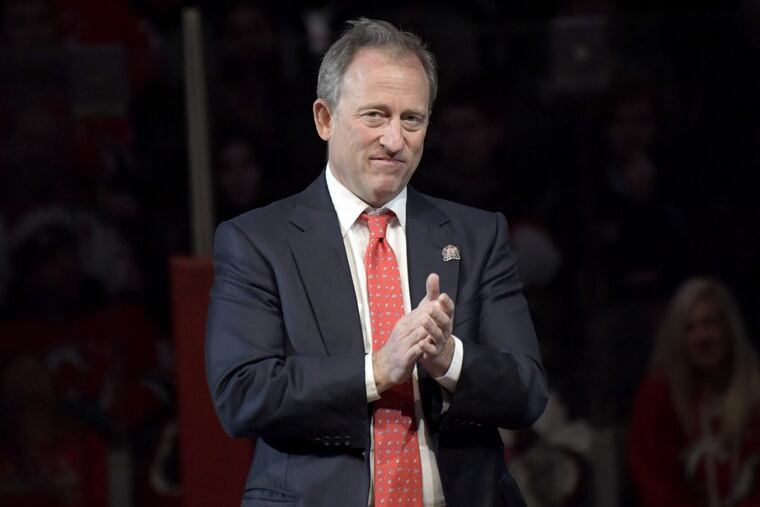How Sixers owner hopes to profit in Trump's America
Should we all try to invest like Josh Harris?

The 76ers' billionaire owner, investor Josh Harris, is back in the news. This time it's because his firm, Apollo Global Management, lent $184 million to the family real estate company of Jared Kushner, President Trump's senior adviser and son-in-law, to finance a Chicago real estate investment. It's one of the larger office-building loans Apollo made last fall, as the New York Times noted Thursday; though Apollo has also made much larger investments.
The loan followed Harris' repeated visits to the White House over the previous several months to help the Trump administration concoct plans for upgrading American highways and other infrastructure. Those plans turned out to rely much more on private financing (from firms like Apollo) to be paid through higher tolls (from you and me) than traditional highway spending financed by fuel taxes — or income taxes, which under Trump are going down.
Citigroup financed a larger Kushner project in New York. A unit of Japan's Softbank financed another Kushner project, at Journal Square in Jersey City, N.J., company records show.
It's an unusual fact of the Trump presidency that the First Family's business interests routinely seek funding from companies as powerful and influential as Citi, Softbank, and Apollo. A lot of politicians have been slammed for much smaller potential conflicts of interest.
But that doesn't prove these people sold public policy for ready cash. Kushner's representatives say he doesn't make business decisions while he works at the White House. Harris wasn't the one who approved the loan, Apollo says.
Still, it's not just the Chicago loan or the prospect of infrastructure deals that ties Trump's policies and Harris' interests. As reader Johnny Zito (of media and design shop South Fellini) reminded me, I wrote last year that Apollo purchased a Kennett Square firm, Phoenix Services Inc., that buys scrap metal and slag from U.S. steelmakers and makes it available for melting and resale. (Phoenix also has infrastructure clients, though it was temporarily banned from selling road materials to PennDot in 2014 after state inspectors found steel slag mixed into its cement base.)
On Thursday, Trump said he plans to slap a fat 25 percent tariff on imported steel. He has said tariffs will punish China for illegal trade practices, while restoring U.S. steel jobs that vanished in the 1970s and '80s.
That sounds like good news for U.S. companies like Phoenix and its clients, which will gain some protection from foreign competition. Though, despite what Trump has said, a steel tariff doesn't punish China directly: the U.S. imports most of its foreign steel not from China, but from Canada, Brazil, South Korea, Mexico, Japan, and other allied or at least neutral nations, several of whose currencies slid lower on the tariff news.
That's not all that fell. There are a lot more U.S. steel consumers than U.S. steel producers. Steel users, from canners to car makers, will have to pay more for steel once tariffs go through — whether or not Europe and other places retaliate by boosting tariffs on U.S. goods, as they have threatened to do.
So while U.S. Steel, Nucor, and other steel stocks gained a little, the rest of the U.S. stock market dropped after Trump announced his tariff plans.
And yet: You don't have to be a conspiracy theorist to start believing that Harris' firm is onto something profitable. Maybe Apollo has been prospering since long before Trump and Kushner moved to Washington precisely because its dealmakers are good at sniffing the wind and investing in sectors most likely to benefit from the government in power, and other arcane factors.
Should we all try to invest like Josh Harris? Apollo's other holdings at the moment include, for example, Bumble Bee Foods (tuna), Erickson (helicopters), Teladoc (the remote-doctoring service favored by the newsroom union health plan at the Inquirer), and UniTek Global Services, a Comcast cable outsourcing contractor based in King of Prussia. Plus, companies in the oil and gas business, among other firms in government-regulated industries.
You or I might lose a lot of money on any of those investments; Apollo is big enough to spread the risk. In fact, Pennsylvania public investment managers have been betting for years that Harris' firm can see through walls: The state workers' (SERS), state teachers' (PSERS) and Philadelphia city pension systems have invested more than $500 million into Apollo funds since the mid-1990s.
How's that going? Actually, it's not clear that taxpayers are enjoying any insider-quality advantage, at least in recent years:
PSERS paid Apollo $8 million in fees last year, but has not yet recorded net profits for its 2006 investment in an Apollo real estate finance portfolio or its 2013 investment in an Apollo fund specializing in troubled companies. Philadelphia has posted returns showing the city lost money most years, after investing $100 million with Apollo in 2013; the city has since withdrawn most of its investment. SERS made tens of millions from Apollo investments in the late 1990s and early 2000s, but has collected only modest annual returns from $39 million invested in a 2006 fund.
The SEC ordered Apollo to return $53 million to investors in 2016, including at least $30,000 to SERS, for extracting unreported payments before passing the remaining profits to shareholders.
And yet the SERS board of Pennsylvania politicians and retiree reps still voted to send Apollo $100 million to invest last summer.
Of course, some Harris investments do better than others. Forbes estimates the 76ers have quadrupled in value since a group headed by Harris bought the team in 2011 (and it started winning games and filling the Wells Fargo Center).
But Harris' share of that gain is all his, not his clients': It's a personal investment, made with fees and profits the billionaire investor has collected from Pennsylvania and other Apollo investors.